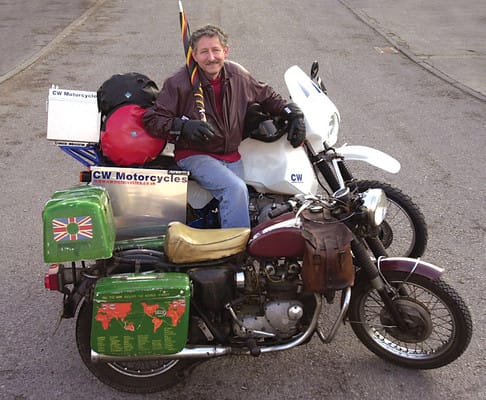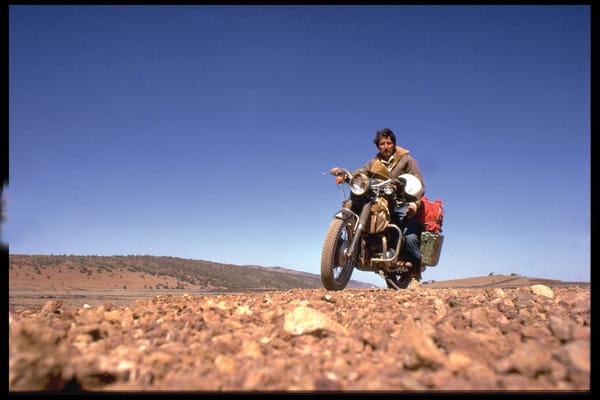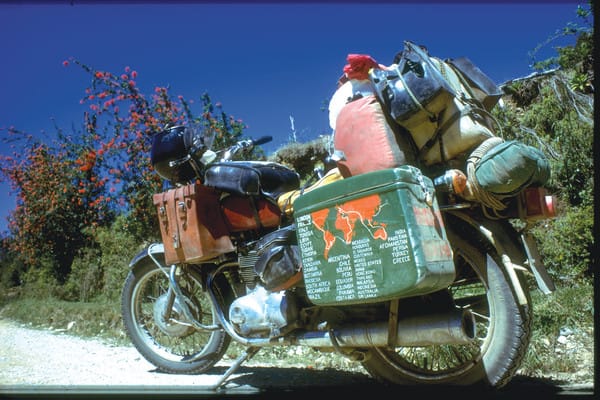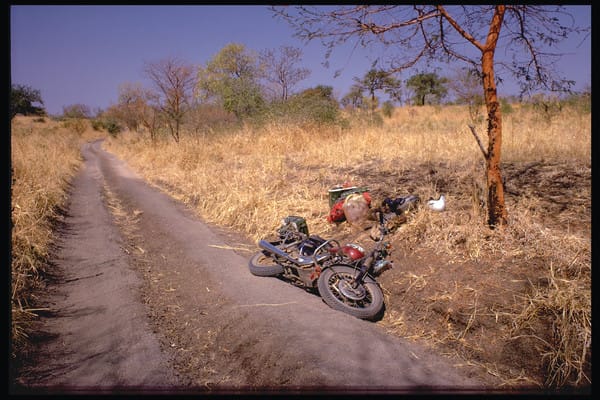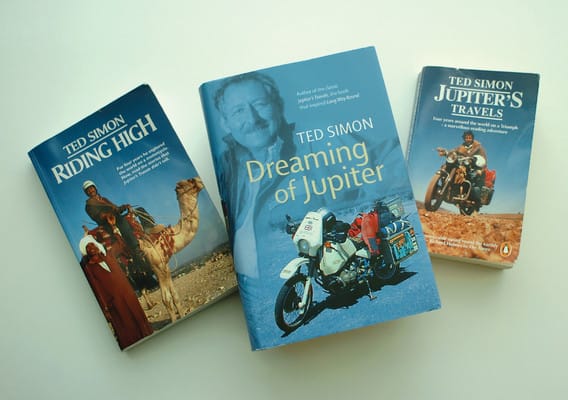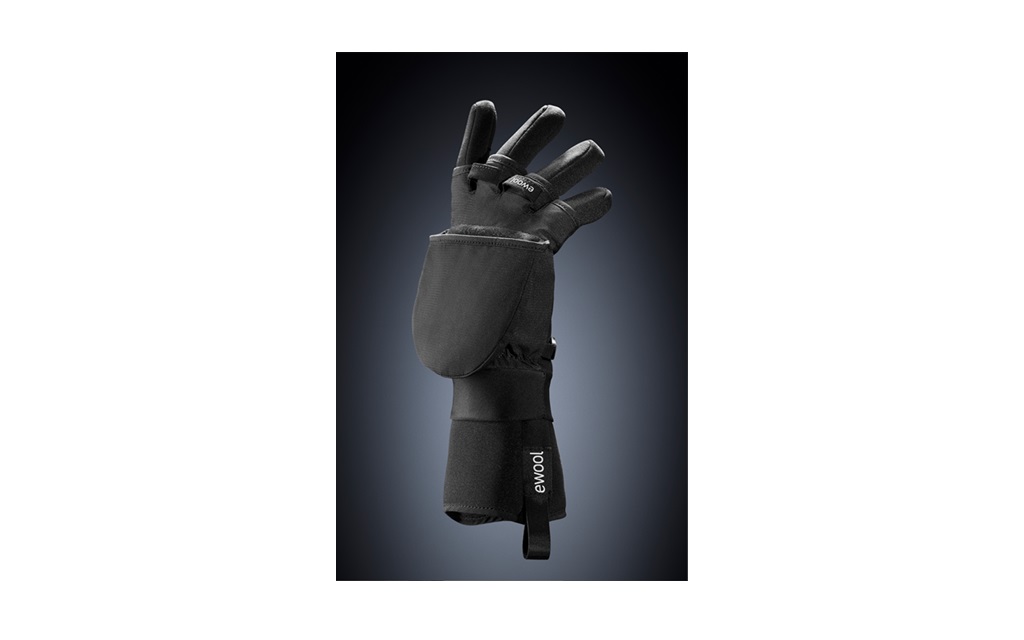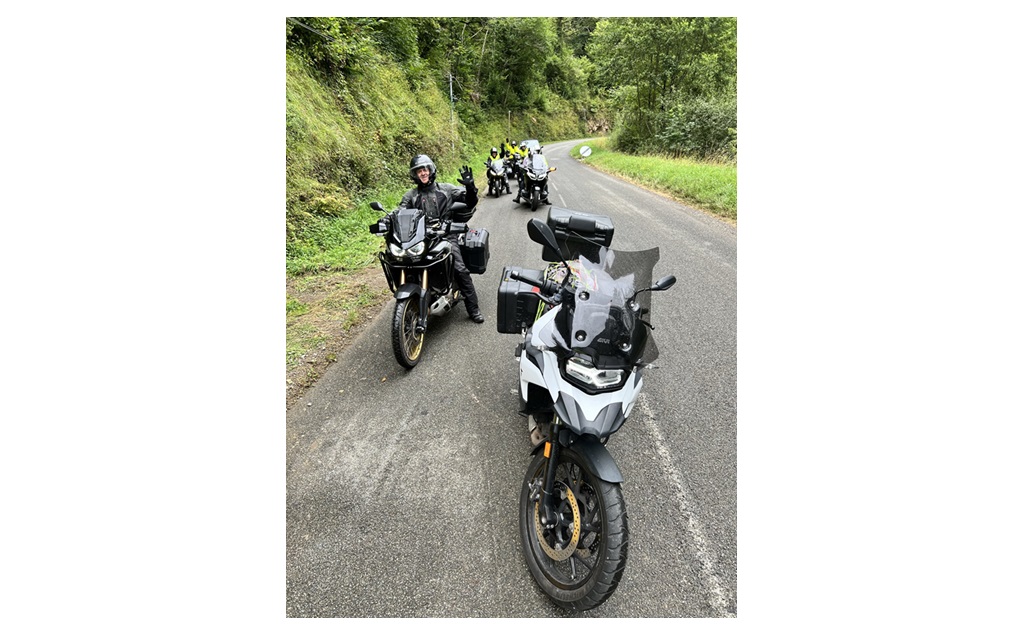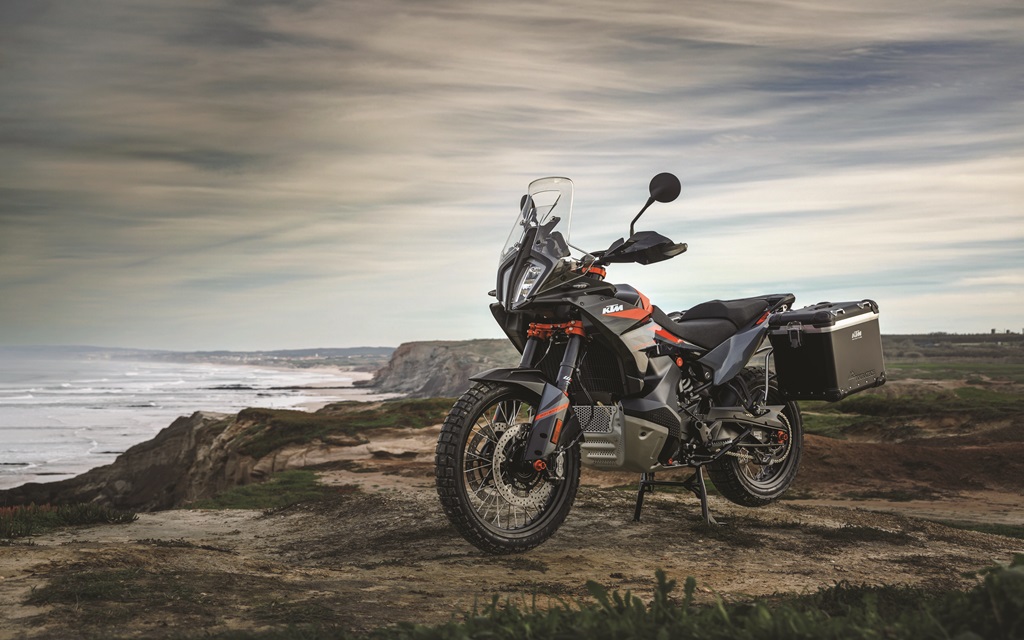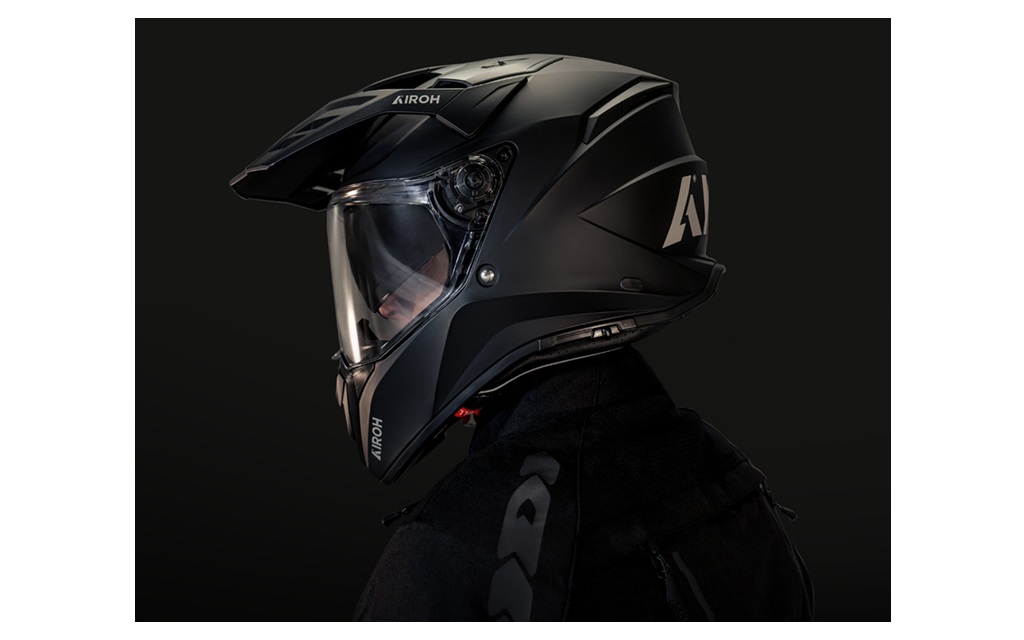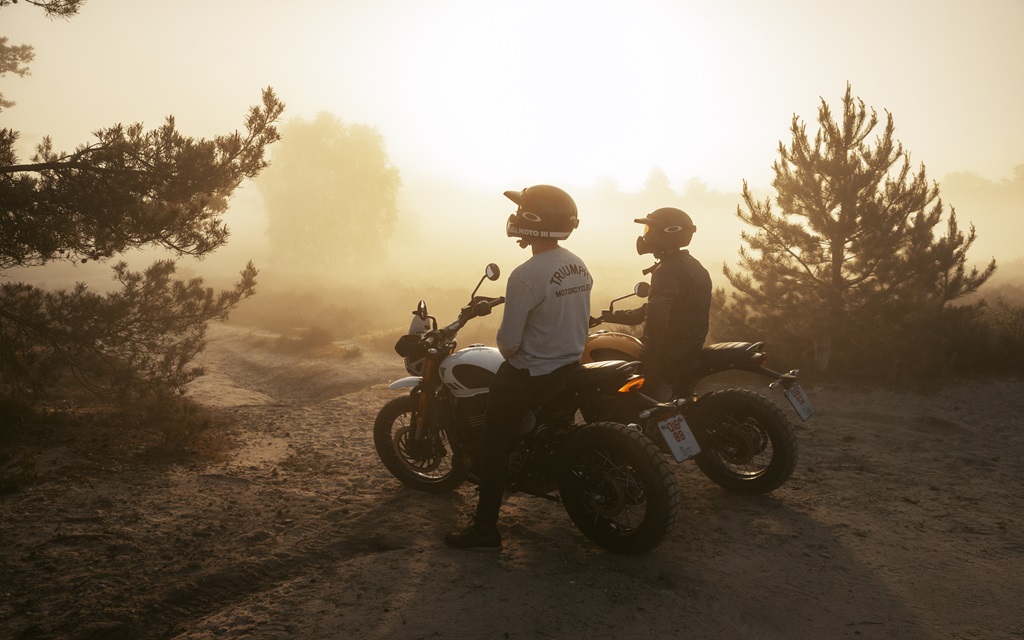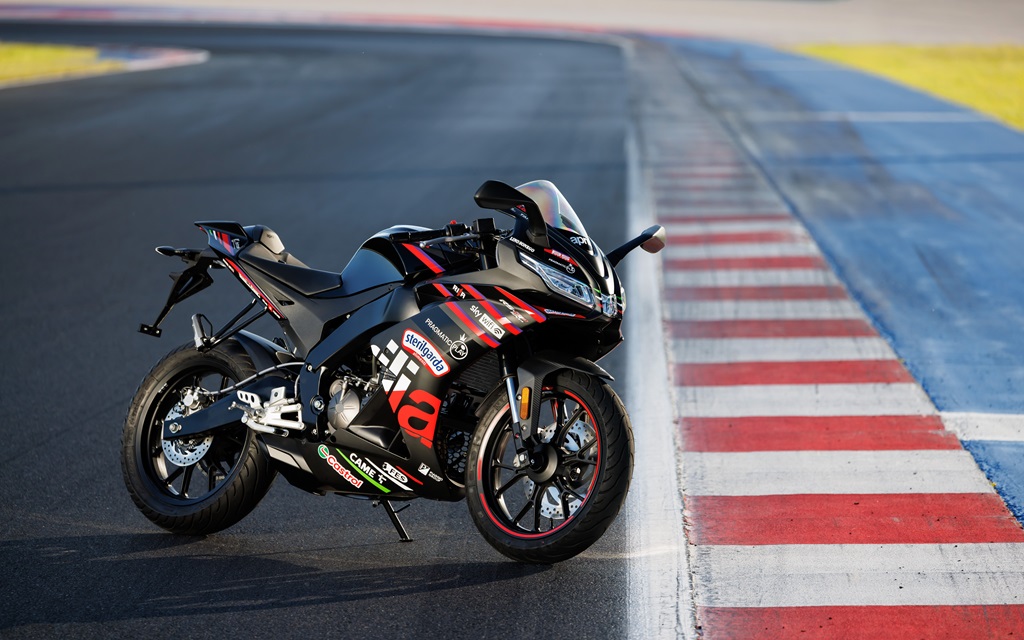He is nothing if not a contradiction: Motorcycling’s most famous globetrotter is not even that keen on motorcycling. Uwe Wachtendorf makes a trek of his own just to find him.
Ted Simon is a hard man to visit. Reaching his self-built home on the outskirts of a sequestered Northern California town requires the navigation of 50 kilometres of maniacal turns and elevation changes. The road leaves no margin for error: the edge of the pavement is marked by sheer drops or rock faces. Even Simon, who has been travelling the route for 28 years, once found himself teetering on its edge, the rear wheels of his car suspended in the air 200 feet above a rocky death.
There is something fitting in making this journey to reach a man whose name is synonymous with adventure travel; the author of three books chronicling years spent circumnavigating the planet by motorcycle should not be found in an urban condo. A cursory synopsis of his works belies what they are really about. The first two books, Jupiter’s Travels and Riding High, tell the tale of his first epic journey. In 1973 the 46-year-old Ted Simon, an untested motorcyclist, embarked on a four-year, 125,000 kilometre, 45 country marathon on a 500 cc Triumph Tiger. He would retrace the route of that journey 24 years later on a BMW R80GS at the age of 70. Dreaming of Jupiter recounts a changed world discovered over two and a half years, 48 countries, and close to 100,000 kilometres.
With a deep admiration of Simon’s achievements, I am nervous about meeting the man, and full of questions that I hope will provide insight into the psychological fortitude required to live on the road for so many years. Stepping out of my rental car, I am suddenly standing face to face with the explorer. His friendly demeanour and sympathetic eyes immediately disarm and I confess to my uneasiness. Laughing, he assures me the nervousness will be short-lived: “After we chat for a bit and you’ve listened to me, you’ll quickly get over it.”
Under a resplendent morning sun we settle down at a table in his garden. His aura is of a person deeply affected by the experiences of his life. I’m reminded of the astronauts that looked back from the cold void of space to our tiny blue planet and returned with a new perspective on life. Simon explains that travelling far from the trappings of the familiar is the only way to find enlightenment. “World travel breaks down habits. There are people who can sit in their backyard and meditate and arrive at profound conclusions about life—Thoreau on Walden Pond, for example—but in my experience the bigger the jolt the more likely you are to break through to some general understanding of things. Throwing yourself into these situations is a way of forcing yourself to relinquish habits that otherwise determine the way you think about things.” Thoreau himself would certainly have approved of Simon’s methodology, for he once commented, “How vain it is to sit down to write when you have not stood up to live.”
Simon continues by challenging my perception that travelling causes people to change. “I don’t really think people change, they just evolve. It’s all there; it’s a question of uncovering it, releasing it, and that’s what travel does. It opens and makes connections that weren’t there before. You find out a lot about yourself and about the world and how you fit into it. There was a lot of stuff flowing back and forth between me and the people that I met. Meetings were very intense. Emotions were very intense. I had complete friendships in 24 hours.”
Many consider Ted Simon to be the trailblazer of a motorcycle subgenre. Although they follow metaphorically in his tire tracks, most world travellers opt for a more expedient and economically viable route than the deliberately oblique exploration undertaken by Simon. “I’ve had this status thrust upon me. I keep reading that I’m the godfather of adventure motorcycle travel.” Undeniably the most famous of those that he inspired are actors Ewan McGregor and Charley Boorman, who themselves have done the most to popularize adventure travel by motorcycle. Even nonriders have been titillated by the experiences of the British duo in their Long Way Round and Long Way Down TV series and books, yet it was Simon who McGregor credited as being the inspiration for their endeavour. “The London Sunday Times phoned me in 2004 to tell me that Ewan McGregor was going to go around the world. ‘Who’s Ewan McGregor?’ I said. I had no idea who he was. They said he was a film star, and would I like to write about it if they could get him to talk to me?” I recalled being surprised by Simon’s cameo in Long Way Round, and wondered how their paths crossed. “They [the producers] asked where I would like to meet him and showed me the route. I just put my finger on Mongolia.”
Those unfamiliar with the Jupiter books would be misinformed if told that they were simple travelogues or merely the stories of a man on a motorcycle. The tales are interlaced with deep insight and the reflective thoughts that reveal truisms of life unnoticed by those of us caught up in the frantic pace of Western society. When I reveal my admiration at his ability to distil observations of life into acutely powerful statements, Simon’s reply is predictably humble: “It comes out of an urgent desire to understand the world and one’s place in it. It’s a product of curiosity and need. With travel the important thing is to go as deep into things as you can, which means making yourself vulnerable and participating in the world that you are travelling through. It’s an intensely interesting, complex and incomprehensible place, and it’s wonderful to be able to wander around in it.”
I get the impression from our conversation that the 77-year-old will never consider anything approaching a traditional retirement. Between episodes of working on the house that he has built himself (and that he describes as a serious problem because it represents the antithesis of travel), there are always trips to be made. I wonder what drives someone like Simon to remain in constant motion. His life is a self-perpetuating cycle of travel and writing. Having been an adolescent in England during the Second World War, he refers to himself during that time as a prisoner on an island. “I was desperate to get out. All the news was on places you couldn’t go to: Africa, Asia, Russia, Norway, France and Spain. Probably the biggest journey was the one that I made by bicycle to the Mediterranean as soon as the war was over. When I look back on it I don’t know how my mother had the courage to let me go, or why it never occurred to me to ask anyone else to come. I just had to do it on my own. I have friends that went the other way. They developed very safe, lucrative careers, had children and did all the right things.”
Although Simon’s other books don’t involve motorcycles, his public persona is permanently intertwined with the vehicle. It’s a relationship best described as a case of strange bedfellows: incorporating a motorcycle into his first journey had little to do with enthusiasm for them; instead it was an objective decision to use the best tool for the job. In fact, he had never owned a motorcycle prior to leaving on a four-year journey with one. “I wasn’t a motorcyclist and I’m not sure that I’ve ever become one. It’s certainly not from my motorcycling prowess that people celebrate me; it’s got more to do with a combination of my ability to write and my obstinate persistence to go on doing this kind of thing. It never occurred to me that you could actually smell things on a motorcycle, which was one of the nice discoveries, to be involved with the environment and not shielded from it.
Simon quickly made up for his lack of riding experience by accumulating over 200,000 kilometres on two trips. We discuss the evolution of motorcycles, and the supposed superiority of contemporary machines. “I’m really conflicted by this. Although there have been technological improvements in motorcycles, they dominate the experience too much. You’re bringing too much of your own world into this other world, whereas with the Triumph I did everything I could to diminish the impact of the motorcycle.” Simon isn’t a small man, but he agrees when I comment on the sheer size of specialty adventure bikes like BMW’s R1200GS Adventure and KTM’s 990 Adventure. “My GS, from the second trip, was almost impossible to pick up, especially with luggage on it, I thought quite a lot about whether it was really an improvement. Technologically, of course it was an improvement, but as an instrument for what I was doing, I think the Triumph was as good as the BMW because of its weight and size. It was easier to take it in and out of hotel rooms.”
“The other thing about the GS was that it had an 11 gallon tank, which was always full when I least needed it to be. The Triumph only had a three-gallon tank, so I did need a Jerry, but there’s a long way to go between 3 and 11 gallons; there’s a lot of room for compromise. And you certainly don’t want it all sitting over your front wheel if you’re going through the desert. Little that I know about desert riding, I do know that.” Simon now advises without hesitation that prospective travellers go for smaller, lighter bikes. The journey can be done on anything, and he points to two Kiwis he met in Afghanistan that were using 70 cc Honda Cubs. Simplicity above all else will help you to remain self-sufficient, and ease the stress of a mechanical failure. “There are great benefits to bikes that break down, too. It’s the breakdowns that really give you the best experiences.”
Circumnavigating the planet on two wheels has also evolved. There are numerous websites and forums dedicated to the activity, and it takes no effort to find a blog from someone currently underway. I can tell that Simon is conflicted with the subject, as is to be expected; watching an extraordinary feat descend into the ranks of the ordinary must be a disappointment. “As I set off the second time, nobody paid any attention; you’re just another bloke with a lot of luggage on his bike. It’s all catered for. Touratech is going to give you all the stuff you need and Horizons Unlimited are going to tell you exactly what’s happening at every border. Is it a good thing or isn’t it? I don’t feel qualified to answer that. This whole thing about going around the world is a contrivance really. It’s just a label, but you need to have some simple phrase that expresses a grand idea. Now it’s just an acronym, RTW, and everybody does it.”
Simon keeps an Aprilia scooter for running errands. Its 50 cc engine is reluctant to start, but after a minute of kicking the engine over, it springs to life in a puff of two-stroke smoke. Simon is off to retrieve the mail at the end of his long drive and blasts off, wobbling wildly and narrowly missing my rental car. Waiting for his return I wonder if this will be the day that his wanderlust will sweep him away on an impromptu transcontinental journey by scooter, leaving me to forever wonder about his disappearance. It turns out that another journey is only a few weeks away.
“I’ve got a BMW 650 Funduro in Germany and I’m going to be on it for the next five months. My book is being translated into Spanish so I’m going to Spain for the first month, and then I’m going to England to do a couple of rallies and to prepare for August and September when I’ll be riding around for the book I have to write about England.” When I ask if this upcoming book will fall into the series of Jupiter’s books he simply laughs and says, “Forget Jupiter.” There’s excitement in his voice discussing future plans, but after the impact of that initial odyssey 36 years ago, I question the significance of subsequent trips: “Has your first trip defined your life?” “Yes,” he says with an air of contentment. “Everything else is a bonus after that. I’d like life to go on a good deal longer if possible, but I certainly feel that it’s all sort of a gift, really.”
